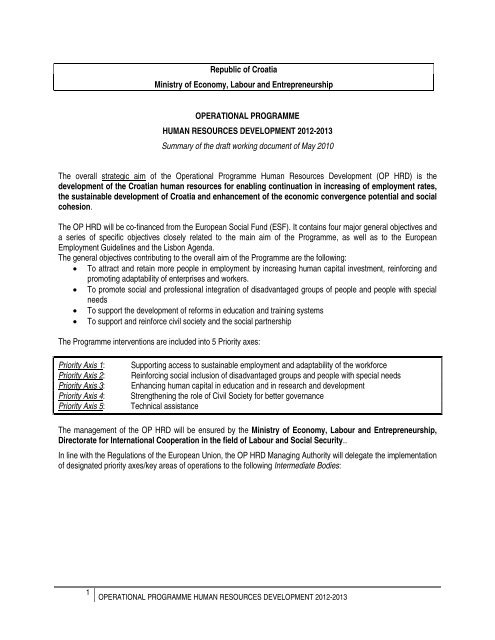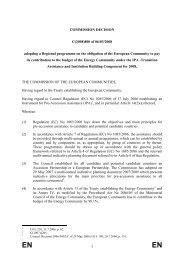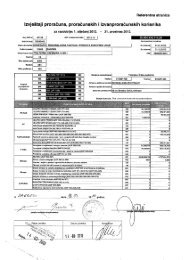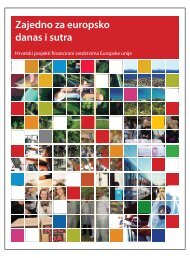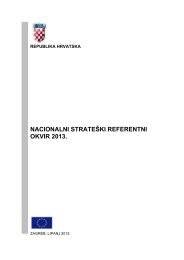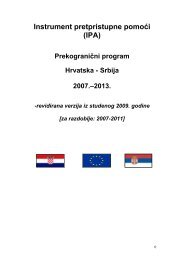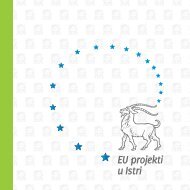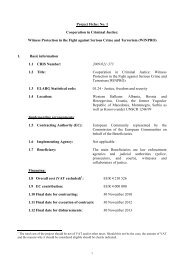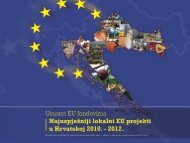Republic of Croatia
Republic of Croatia
Republic of Croatia
You also want an ePaper? Increase the reach of your titles
YUMPU automatically turns print PDFs into web optimized ePapers that Google loves.
• Micro credits for unemployed and disadvantaged groups in order to start a business;• Knowledge and skills for <strong>of</strong> SMEs’ adaptability;• Focused vocational education and counseling.1.3. Strengthening the operation and life-long guidance <strong>of</strong> CES and other labour market supportmechanisms• Enhancement <strong>of</strong> operations <strong>of</strong> CES central and regional structures;• Upgrading <strong>of</strong> the services provided by the CES;• Strengthening life-long guidance.1.4. Strengthening <strong>of</strong> the occupational health and safety at work• Support for the development <strong>of</strong> institutions;• Raising awareness and enhancing knowledge <strong>of</strong> all actors in health and safety at work;• Support for solving health and safety at work problems related to injuries at work, occupational andwork-related diseases and sick-leave, return to work problems, workers with disability;• Development and provision <strong>of</strong> preventive programs;• Support for applied research in health and safety at work;• Capacity building.Potential Beneficiaries• Potential beneficiaries per type <strong>of</strong> operations are:1.1. Implementation <strong>of</strong> active labour market measures through national and local initiatives• CES (department for the implementation)• Chambers• Trade unions• Employers’Associations• Regional development agencies• Business Incubators• Unemployed, in particular young unemployed• Training providers• Private sector employers1.2. Supporting the entrepreneurship development and improving SMEs and crafts competitiveness• Regional employment <strong>of</strong>fices• Chambers• Counties and municipalities• Trade unions• Employers associations• Regional development agencies• Business incubators• Workforce wishing to develop their own business• Entrepreneurship / training support institutions• Banks, selected for their sustainability1.3. Strengthening the operation and life-long guidance <strong>of</strong> CES and other labour market supportmechanisms• CES (department for the implementation)• CES (nation-wide structure)• Unemployed workforce• Chambers• Counties and Municipalities3OPERATIONAL PROGRAMME HUMAN RESOURCES DEVELOPMENT 2012-2013
• Trade unions• Employers’ Associations• Regional development agencies• Business incubators1.4. Strengthening <strong>of</strong> the occupational health and safety at work• Ministry <strong>of</strong> Health and Social Welfare• <strong>Croatia</strong>n Institute <strong>of</strong> Health Protection and Safety at Work• <strong>Croatia</strong>n Institute for Public Health• <strong>Croatia</strong>n Health Insurance Institute for Health Protection at Work• Ministry <strong>of</strong> Economy, Labour and Entrepreneurship• State Inspectorate• Faculty <strong>of</strong> Medicine• Polytechnics/Colleges in Safety at Work• Associations <strong>of</strong> pr<strong>of</strong>essionals in health and safety at work• Employers’ associations• Trade Unions• Enterprises• Employed workforcePriority Axis 2 – Reinforcing social inclusion <strong>of</strong> disadvantaged groups and people with special needsSpecific objectivesThe goal <strong>of</strong> Priority axis 2 is to promote social and pr<strong>of</strong>essional integration <strong>of</strong> less favorite groups <strong>of</strong> peopleand people with special needs and intents to support the implementation <strong>of</strong> specific interventions under thefollowing specific objectives:• Improvement <strong>of</strong> social inclusion <strong>of</strong> persons at disadvantage in educational institutions;• Support social inclusion <strong>of</strong> disadvantaged groups through facilitation <strong>of</strong> their access at the labourmarket;• Development <strong>of</strong> social services and the capacity <strong>of</strong> their providers in combating social exclusion andpoverty.The target groups <strong>of</strong> the interventions under the Priority axis 2 are:For educational interventions:Roma students, students with disabilities, students with behavioural problems and/or learning difficulties, early schoolleavers or young people at risk <strong>of</strong> becoming early school leavers; students with poor socio-economic conditionsand/or dysfunctional families.For employment interventions:Long-term unemployed social assistance beneficiaries, unemployed persons with disabilities, Roma, former addicts,the homeless, ex prisoners, persons living in households which revenue per household member is lower than socialassistance threshold and other long term unemployed with specific additional risk <strong>of</strong> social exclusion, elderly anddisabled persons, mentally ill persons, victims <strong>of</strong> family violence, disadvantaged youth.Operational objectives2.1. Supporting access to education by groups with special needs4OPERATIONAL PROGRAMME HUMAN RESOURCES DEVELOPMENT 2012-2013
• Promote social inclusion <strong>of</strong> persons at disadvantage in educational institutions;• Facilitate inclusion <strong>of</strong> pupils/students at disadvantage in educational institutions through different tailormadeactivities;• Improve capacity <strong>of</strong> schools/their staff in integration <strong>of</strong> children/youth at disadvantage in education;• Develop new teaching materials for the pupils/students with disabilities;• Support innovative projects aimed at persons at disadvantage in educational institutions.2.2. Supporting access to employment <strong>of</strong> disadvantaged groups• Promoting sustainable employment <strong>of</strong> people with disabilities and other people at disadvantaged;• Actions in the field <strong>of</strong> social economy2.3. Supporting the development <strong>of</strong> social services and the capacity <strong>of</strong> their providers in combatingsocial exclusion and poverty (including the improvement <strong>of</strong> employment opportunities)• Support to the further implementation <strong>of</strong> reform activities in the social welfare sector;• Empower community-based social services for groups in a disadvantage;• Support families with dependent family members in the reconciliation <strong>of</strong> working and family life;• Support social inclusion <strong>of</strong> youth at a disadvantage.• Support innovative as well as tailor-made activities aimed at development <strong>of</strong> youth’s skills and selfesteemas well as their empowerment;Potential BeneficiariesPotential beneficiaries per type <strong>of</strong> operations are:2.1. Supporting access to education by groups with special needs• Ministry <strong>of</strong> Science, Education and Sports (MoSES)• All Higher Education Institutions• VET schools• Disadvantaged persons with special educational needs• Non-governmental organisations active in relevant fields• Preschool Education Institutions, Primary and Secondary schools• NGOs dealing with persons with disabilities• Counties and municipalities• Enterprises• Centers for education and rehabilitation <strong>of</strong> students with disabilities• City administrative <strong>of</strong>fices for detention reform institutions• Family Centers at the county level2.2. Supporting access to employment <strong>of</strong> disadvantaged groups• Ministry <strong>of</strong> Health and Social Welfare• <strong>Croatia</strong>n Employment Service• CSO’s• Regional employment <strong>of</strong>fices• Social institutions• Chambers• Trade unions• Employers’ Associations• Counties• Municipalities• Local and regional development agencies• Enterprises• Other institutions and organizations in the scope <strong>of</strong> social inclusion and labour market5OPERATIONAL PROGRAMME HUMAN RESOURCES DEVELOPMENT 2012-2013
2.3. Supporting the development <strong>of</strong> social services and the capacity <strong>of</strong> their providers in combatingsocial exclusion and poverty (including the improvement <strong>of</strong> employment opportunities)• Ministry <strong>of</strong> Health and Social Welfare• Social welfare institutions• CSOs• Regional employment <strong>of</strong>fices• Chambers• Trade unions• Employers’ Associations• Counties• Municipalities• Local and regional development agencies• Enterprises• Private and public education and training institutions and other institutions and organisations in the field<strong>of</strong> social inclusion or related to local labour marketsPriority Axis 3 – Enhancing human capital in education and in Research and DevelopmentSpecific objectivesThe overall objective <strong>of</strong> Priority Axis 3 is to support the development <strong>of</strong> reforms in education and trainingsystems in order to improve the quality <strong>of</strong> the education system and harmonize it with the European standards.The general aims and principles <strong>of</strong> <strong>Croatia</strong>’s national educational system are laid down in the Education SectorDevelopment Plan (ESDP) 2005-2010, which is co-ordinated by the Ministry <strong>of</strong> Science, Education and Sports(MoSES). For achieving the aforementioned objective, the following specific objectives contribute to this end:• enhancement <strong>of</strong> the educational system;• development <strong>of</strong> the <strong>Croatia</strong>n Qualifications Framework to support lifelong learning concept;• development <strong>of</strong> human potential in research and innovation and support <strong>of</strong> networking, cooperation andtransnational cooperation between universities, institutes and enterprises.Operational objectives3.1. Enhancing the educational system• Strengthening the Educational institutions with the aim <strong>of</strong> increasing quality and access to education;• Quality <strong>of</strong> educational services improved by implementing reforms based on strategies, with a view <strong>of</strong>raising people’s responsiveness to the needs <strong>of</strong> a knowledge-based society;• Establishment <strong>of</strong> mechanisms for the development <strong>of</strong> a quality assurance system;• Strengthening VET;• Harmonization <strong>of</strong> Adult and Higher Education system with labour market needs and social inclusionprinciples;• Further development <strong>of</strong> Teacher Training system.3.2. Further development <strong>of</strong> the <strong>Croatia</strong>n Qualifications Framework to support lifelong learning concept• Strengthening the CROQF• Strengthening the Lifelong Learning system3.3. Development <strong>of</strong> human potential in research and innovation and support <strong>of</strong> networking, cooperationand internationalisation activities between universities, institutes and enterprises6OPERATIONAL PROGRAMME HUMAN RESOURCES DEVELOPMENT 2012-2013
• Further development and increased mobility <strong>of</strong> human (and especially young) potential in research andinnovation;• Support <strong>of</strong> mobility, connectivity and cooperation to outstanding young scientists and pr<strong>of</strong>essionals from<strong>Croatia</strong> to visit research and development facilities abroad.Potential BeneficiariesPotential beneficiaries per type <strong>of</strong> operations are:3.1. Enhancing the educational system• All Higher Education institutions• Education and Teacher Training Agency (ETTA)• Ministry <strong>of</strong> Science, Education & Sports (MoSES)• Teachers and non-teaching staff (principles and education specialists) in pre-primary institutions,primary and secondary schools• VET secondary schools• MoSES Department for Quality Assurance in Secondary Education• Educational Agencies• National Centre for External Evaluation <strong>of</strong> Education• Universities• Research centres• Adult education institutions3.2. Further development <strong>of</strong> the <strong>Croatia</strong>n Qualifications Framework to support lifelong learning concept• All Higher Education institutions• AVET and the Agency for Adult Education• Education and Teacher Training Agency (ETTA)• Ministry <strong>of</strong> Science, Education & Sports (MoSES)• Teachers and non-teaching staff (principles and education specialists) in pre-primary institutions,primary and secondary school• VET schools• MoSES Department for Quality Assurance in Secondary Education• Educational Agencies,• The Ministry <strong>of</strong> Tourism• Pr<strong>of</strong>essional associations, tourist boards and state <strong>of</strong>fices at the regional level• National Centre for External Evaluation <strong>of</strong> Education• Universities• Research centers• Adult education institutions• Adult education institutions (primary and high schools, open universities etc)• Employers' Associations• Trade Unions3.3. Development <strong>of</strong> human potential in research and innovation and support <strong>of</strong> networking, cooperationand internationalisation activities between universities, institutes and enterprises• Universities and research institutes• Technology based SME’s• R&D centers• Public administration7OPERATIONAL PROGRAMME HUMAN RESOURCES DEVELOPMENT 2012-2013
Priority Axis 4 – Strengthening the role <strong>of</strong> Civil Society for better governanceSpecific objectivesThe objective <strong>of</strong> Priority axis 4 is to support and reinforce civil society, an issue that will be achieved by thefollowing general targets:• Enhancement <strong>of</strong> the quality <strong>of</strong> social dialogue;• Increasing the capacity and strengthening the role <strong>of</strong> the Civil Society Organisations (CSOs) andbuilding their capacities and partnerships on national, regional and local levels;The specific objectives <strong>of</strong> the Priority Axis 4 are as follows:• Increase <strong>of</strong> the effectiveness and sustainability <strong>of</strong> the social dialogue partners and improve theirorganisational abilities to contribute positively to the quality and continuity <strong>of</strong> the bi- and tri-partite socialdialogue process;• Support small CSOs and grass-roots organisation in implementing community development initiativesaimed to facilitate employment and good governance on the local level;• Strengthening capacities <strong>of</strong> civil society organizations active in the field <strong>of</strong> provision <strong>of</strong> social servicedelivery by developing their internal capacity and ability to provide social services;• Increase effectiveness and sustainability <strong>of</strong> the CSOs in undertaking independent advocacy initiatives;• Strengthen the role <strong>of</strong> CSOs in promotion <strong>of</strong> volunteering as a common and social value;• Support regional support structures aimed at providing information, counseling services, education andother types <strong>of</strong> support to the CSOs at local level.Operational objectives4.1. Promotion <strong>of</strong> Social Dialogue• Reinforcement <strong>of</strong> the national and regional institutions and organizations <strong>of</strong> social dialogue through e.g.strengthening <strong>of</strong> their administrative and expert resources, improving the functioning <strong>of</strong> the informationsystems and improving the functioning <strong>of</strong> the social partner’s organizations through e.g. developmentand improvement <strong>of</strong> programmes;• Preparation and implementation <strong>of</strong> programmes oriented towards the development <strong>of</strong> social dialogue;creation and implementation <strong>of</strong> training programmes for social partners’ experts;• Support for the participation <strong>of</strong> social partners in activities at the European level;• Creation and support for territorial and sector networking within the social partners;• Support <strong>of</strong> analysis <strong>of</strong> draft legal acts and draft policy documents, and elaboration <strong>of</strong> positions in socialdialogue;• Promotion and dissemination <strong>of</strong> best practices on the cooperation between public administration andsocial partners preparation and realization <strong>of</strong> informational campaigns and transfer <strong>of</strong> best practisesfrom national level to local level;• Strengthening the competences <strong>of</strong> the public administration personnel in area <strong>of</strong> cooperation with socialpartners;• Monitoring and evaluation <strong>of</strong> cooperation between public administration and social partner institutions;• Studies, analyses and research on social dialogue, notably sectoral dialogue;• Training <strong>of</strong> mediators in individual labour disputes and setting up <strong>of</strong> mediation centres on county level.8OPERATIONAL PROGRAMME HUMAN RESOURCES DEVELOPMENT 2012-2013
4.2. Strengthening the role <strong>of</strong> Civil Society Organisations for socio-economic growth and democraticdevelopment• Support small CSOs and grass-roots organisation in implementing community development initiativesaimed to facilitate employment and good governance on the local level;• Increase effectiveness and sustainability <strong>of</strong> the <strong>Croatia</strong>n CSOs and in undertaking independentadvocacy initiatives;• Strengthen the role <strong>of</strong> CSOs in promotion <strong>of</strong> volunteering as a common and social value;• Support regional support structures aimed at providing information, counseling services, education andother types <strong>of</strong> support to the CSOs at local level.Potential BeneficiariesPotential beneficiaries per type <strong>of</strong> operations are:4.1. Promotion <strong>of</strong> Social Dialogue• Government Office for Promoting Social Dialogue• Employers' Associations and their regional, local and sectoral branches• Trade Unions and their regional, local and sectoral branches• Economic and Social Committee• Counties and Municipalities• NGOs4.2. Strengthening the role <strong>of</strong> Civil Society Organisations for socio-economic growth and democraticdevelopment• Government Office for the Cooperation with NGOs• NGOs• Employers' Associations• Trade Unions• Counties and MunicipalitiesPriority Axis 5 – Technical assistanceSpecific objectiveProvision <strong>of</strong> assistance for the management and implementation <strong>of</strong> the Operational Programme Human ResourcesDevelopment.Operational objectives5.1 Management <strong>of</strong> the OP and administrative capacity building5.2 Project development and support to the preparation <strong>of</strong> the next programming period9OPERATIONAL PROGRAMME HUMAN RESOURCES DEVELOPMENT 2012-2013


